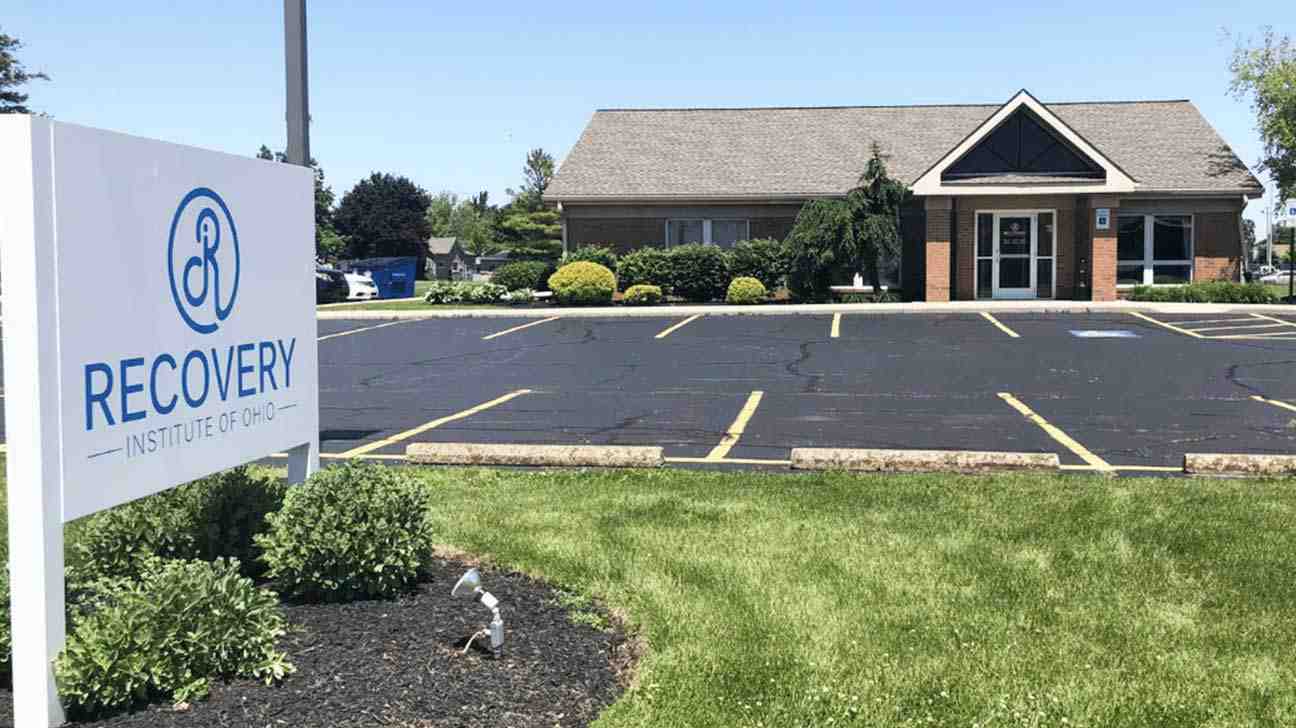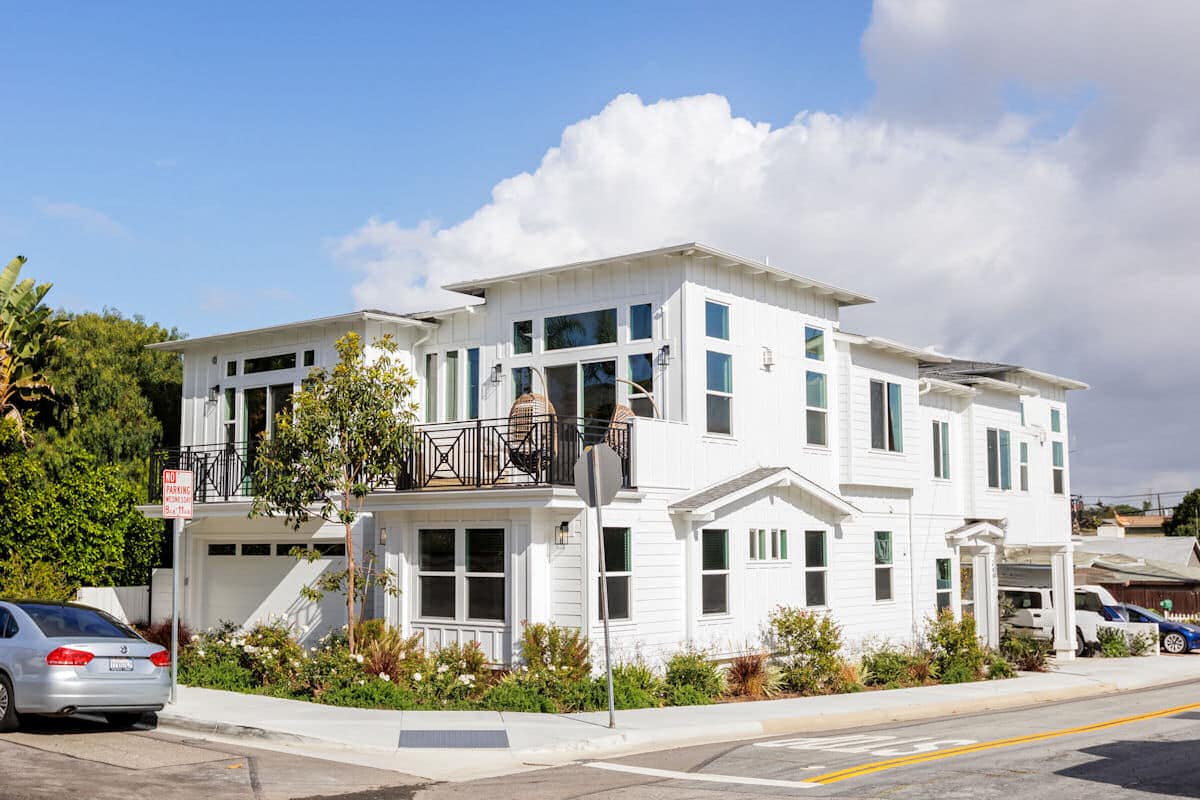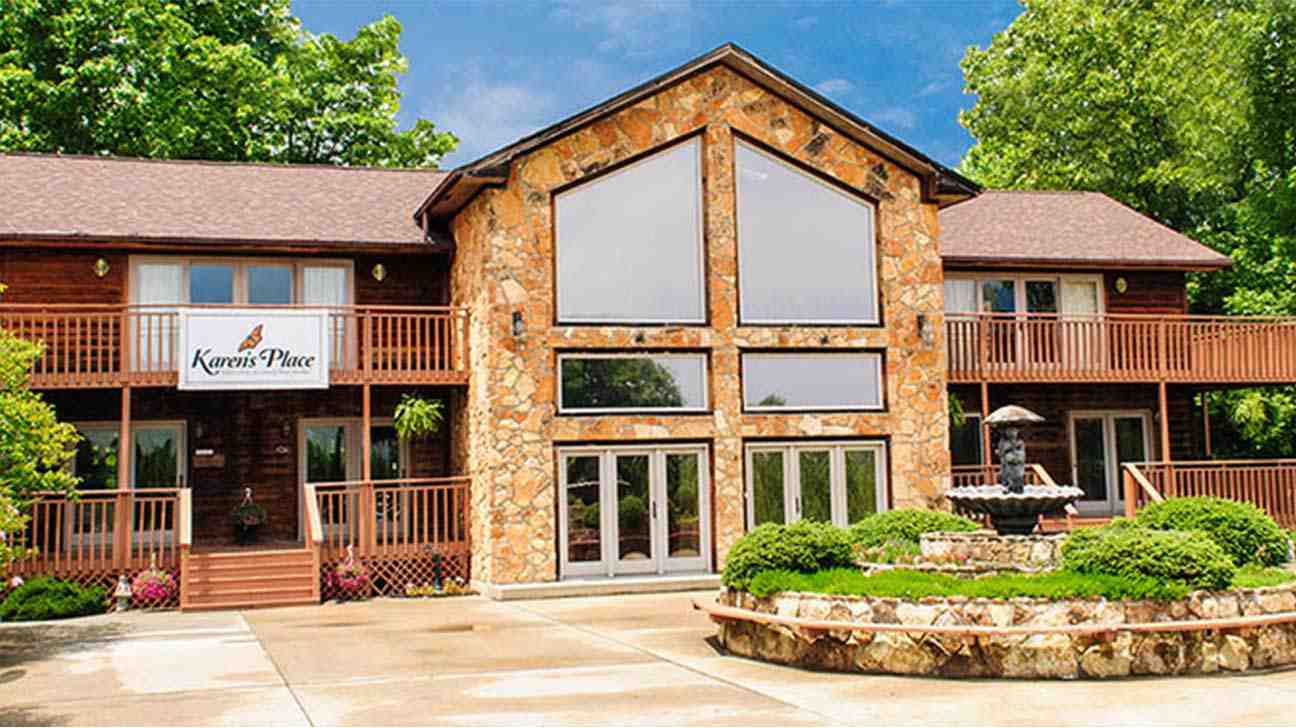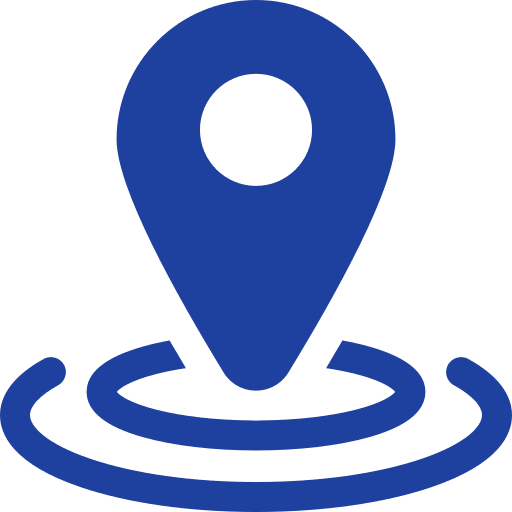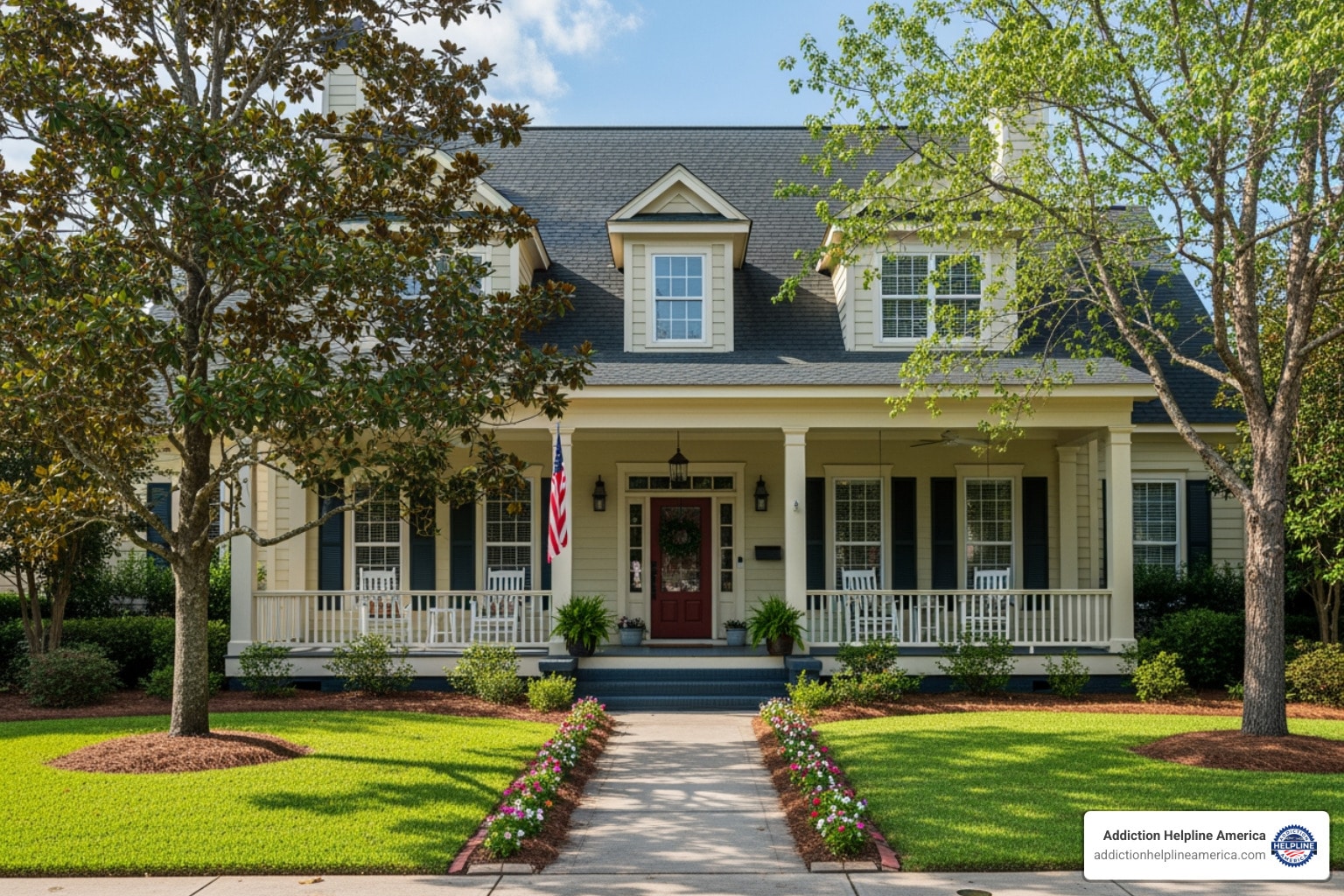
Why Sober Living New Orleans Matters for Your Recovery Journey
Sober living New Orleans provides a crucial bridge between intensive addiction treatment and independent living. After completing detox or rehab, returning directly to old environments can trigger relapse. Sober living homes offer a safe, structured, and substance-free environment where you can practice new coping skills alongside peers who share your commitment to recovery.
These are not clinical facilities but residential communities that foster accountability and support. The average stay is about a year, but you can often stay as long as needed while sober. Key benefits include peer support, a reduced risk of relapse, life skills training, and employment assistance. Costs typically range from $125-$250 per week ($500-$1,000+ per month).
New Orleans offers diverse options, from peer-run Oxford Houses to structured facilities with on-site staff. Some homes are gender-specific or serve specific populations like young adults. Research confirms the model’s effectiveness, showing that residents of peer-run homes have significantly lower substance use, higher income, and lower incarceration rates compared to those in usual care.
At Addiction Helpline America, we guide individuals and families in finding the right sober living New Orleans program to match their recovery goals. Choosing where to rebuild your life is a critical decision, and we’re here to help.
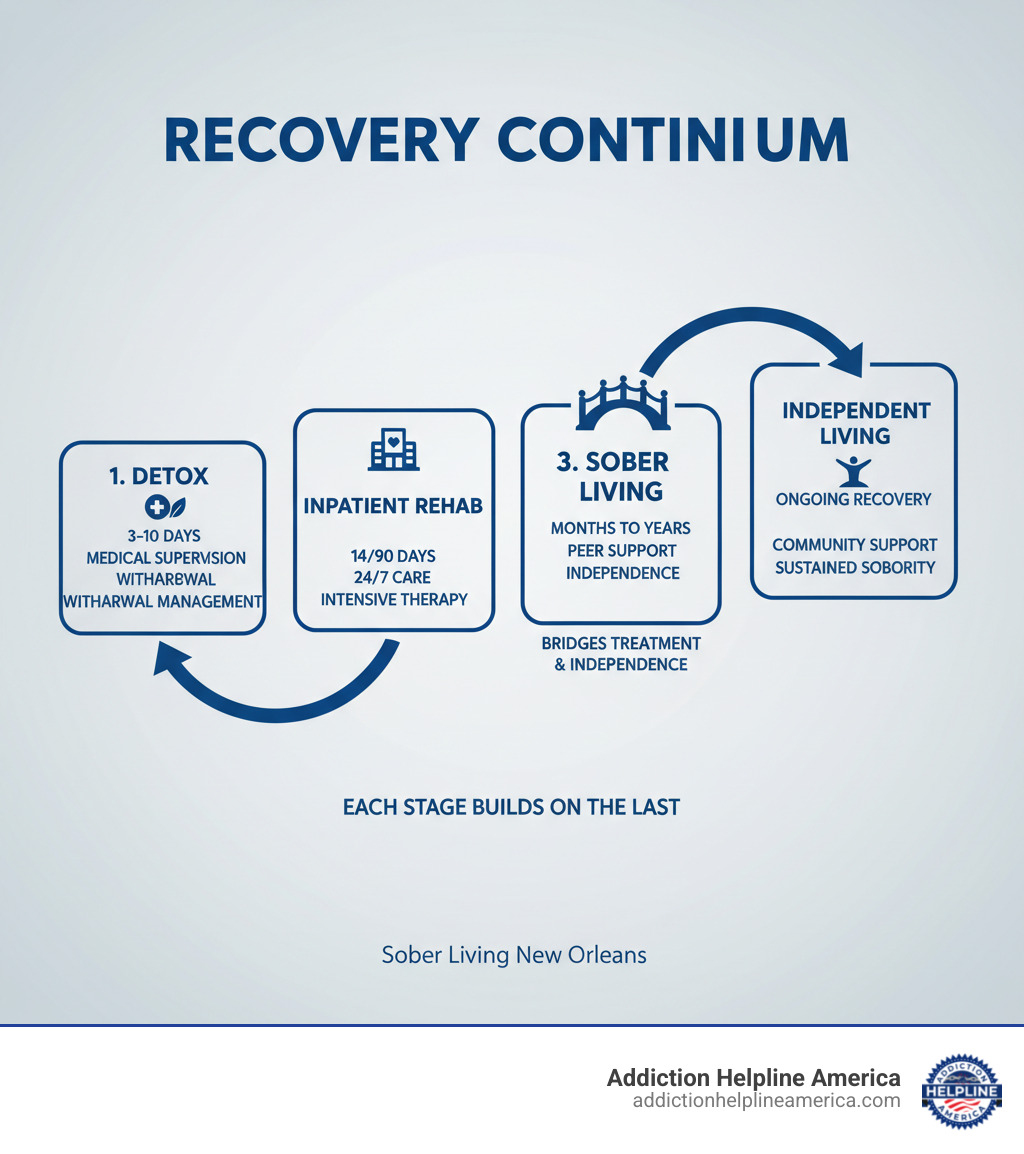
Explore more about Sober living New Orleans:
What is Sober Living and Why is it Crucial for Recovery?
Think of sober living New Orleans as the essential bridge between the protective bubble of inpatient rehab and the total freedom of independent living. It’s where you apply the recovery tools you’ve learned in a real-world setting, but with a safety net of support and accountability.
Unlike inpatient rehab, which focuses on intensive clinical treatment, sober living is about practicing recovery. You manage your own schedule, look for work, and steer daily life in a substance-free environment. It’s also different from a halfway house, which often serves individuals transitioning from incarceration with court-mandated stays. Sober living homes are open to anyone committed to recovery and emphasize resident empowerment.
This structured independence is vital for sustainable recovery. You ease back into life surrounded by peers who understand your journey and hold you accountable. For information about clinical treatment that often precedes sober living, explore alcohol rehab services in New Orleans.
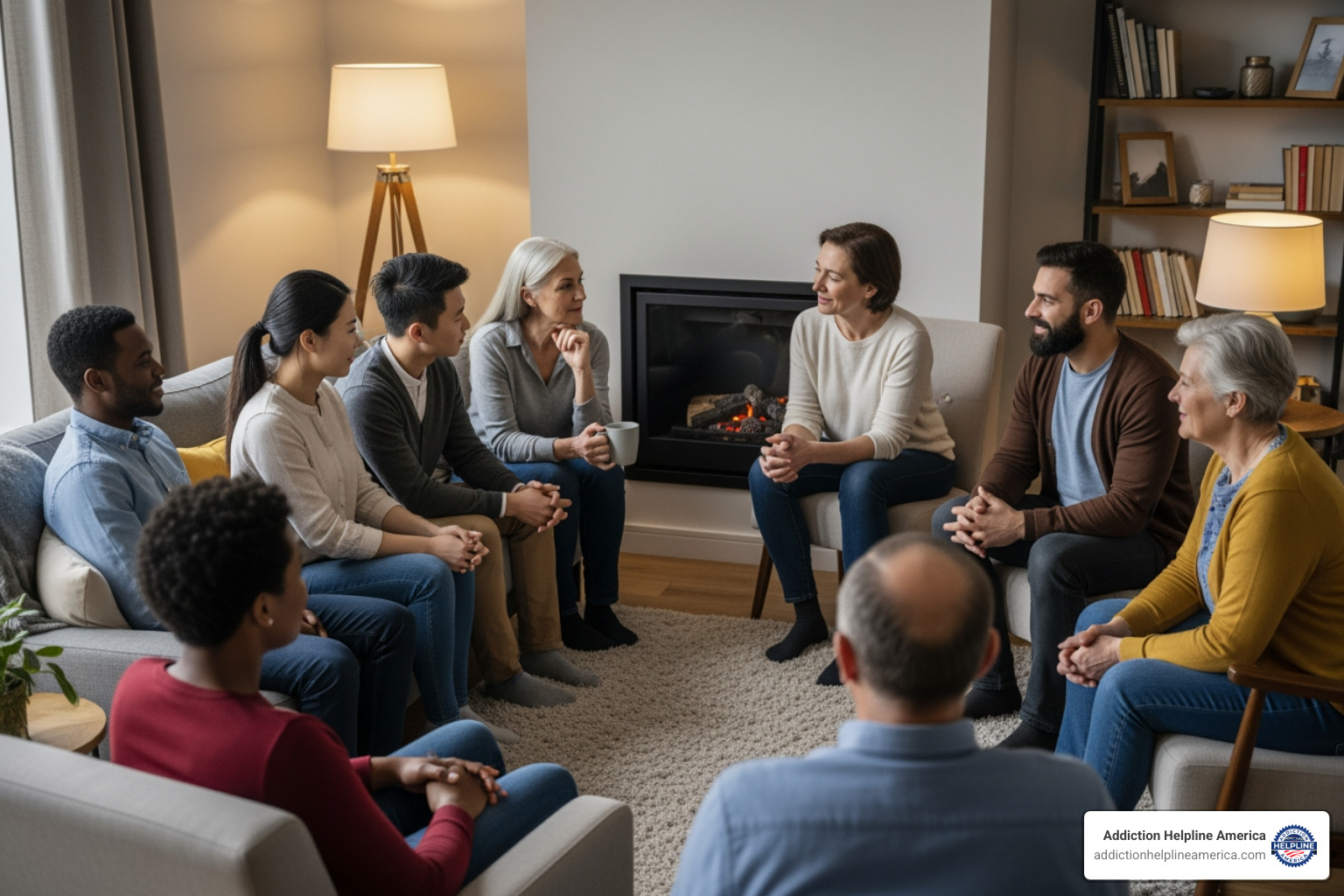
The Primary Benefits of a Supportive Environment
Studies show that a supportive environment dramatically improves outcomes. The benefits of sober living are interconnected and build on one another:
- Reduced Relapse Risk: By providing a safe, trigger-free space without access to substances, sober living homes create a powerful barrier against relapse in early recovery.
- Coping Skills Development: You move from learning coping skills in therapy to actively using them to manage real-life cravings and stressors, making them second nature.
- Sober Relationships: You build a new support system with housemates who become a recovery family, celebrating your victories and understanding your struggles.
- Gradual Independence: You learn to stand on your own two feet step-by-step, managing responsibilities like chores, job searching, and budgeting before facing the pressures of full independence.
- Access to the New Orleans Recovery Community: Homes are often well-connected to local 12-step meetings, support groups, and other resources, helping you build a network that will last long after you move out.
Call Now – Your Journey to Recovery Begins Today!

Take the first step towards a healthier life! Call now to connect with our compassionate team and start your recovery journey today. Your path to healing awaits!
Our recovery specialists are available 24/7 to provide support, and all calls are confidential and free. Reach out anytime – we’re here to help!
Exploring Sober Living New Orleans Models and Options
Sober living New Orleans is not a one-size-fits-all solution. The variety of homes means you can find one that matches your personality, needs, and recovery goals. Understanding the main types of sober living environments is the first step to making an informed choice.
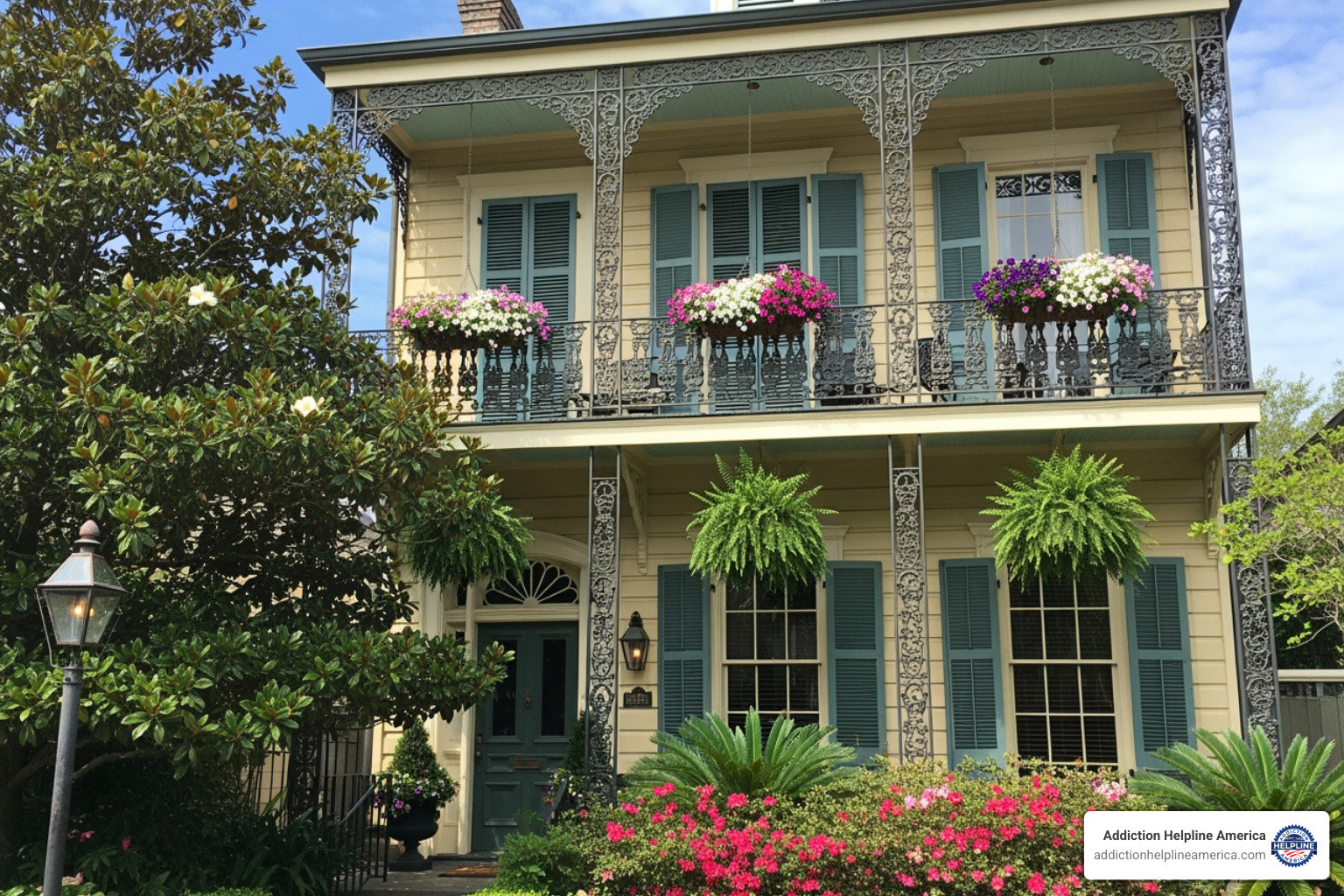
Gender-Specific and Specialized Housing
Many people feel safer and more open in gender-specific environments. New Orleans has a long history of providing these options, such as men-only homes like those offered by Bridge House. Women-only programs, like Grace House, address the unique needs of women in recovery and often prioritize admission for pregnant women. Specialized housing also exists for young adults (18-25), who face distinct challenges, and for the LGBTQ+ community, ensuring an affirming and non-discriminatory space for recovery. For more on specialized programs, you can explore resources like Mercy Multiplied West Monroe LA.
Peer-Run and Structured Sober Living Models
The daily operation of a home significantly shapes your experience. The two primary models are peer-run and professionally managed.
The Oxford House model is a well-researched, peer-run approach. These homes are democratically self-governed by residents who vote on all house decisions and share costs through an Equal Expense Share (EES). There is no live-in staff; accountability comes from peers. Research has shown this model leads to significantly better outcomes in sobriety, employment, and reduced incarceration. The average stay is about a year, but residents can stay as long as they need. You can find evidence-based research and local options for these homes online.
Structured sober living with on-site management offers more oversight. Homes like Imagine House or Golden Doorways employ house managers who enforce rules, offer guidance, and add a layer of professional accountability. This can be ideal for those in early recovery who need more support.
Structured vs. Transitional Housing
Structured housing involves more rules, oversight, and often integration with clinical services like Partial Hospitalization (PHP) or Intensive Outpatient Programs (IOP). Residents can expect mandatory meetings, drug testing, and curfews. Programs like Imagine Recovery and NOLA Detox and Recovery Center offer this integrated model.
Transitional housing, such as programs offered by Odyssey House Louisiana (OHL), often focuses on helping individuals move from institutional settings or homelessness into stable, independent living with ongoing case management.
Accreditation matters. Look for homes accredited by organizations like CARF International (which accredits Bridge House), as this signals a commitment to high standards of quality and care.
A Day in the Life: Support, Structure, and Rebuilding Your Future
Imagine waking up in a sober living New Orleans home. Your day has a rhythm: a house meeting, job searching, a recovery meeting, and shared household duties. This routine isn’t about rigidity—it’s about creating stability where chaos once lived. You’re not just abstaining from substances; you’re actively learning to live responsibly and build self-esteem.

House Rules, Peer Support, and Accountability
Clear rules are the foundation of a safe sober living environment. They are not punitive but act as guardrails for everyone in the house. Common expectations include:
- Zero-Tolerance Policy: Any use of drugs or alcohol results in immediate eviction to protect the sobriety of all residents.
- Mandatory Recovery Meetings: Regular attendance at 12-step or other recovery groups connects you to the broader sober community.
- Household Responsibilities: Sharing chores like cooking and cleaning instills a sense of ownership and teamwork.
- Curfews and Drug Testing: These rules, used by homes like Golden Doorways, provide structure and accountability, reinforcing everyone’s commitment to a sober environment.
In structured homes, house managers provide guidance and ensure rules are followed. But in all models, peer support is the most powerful element. House meetings where residents share struggles and successes create a bond and provide real-world advice from people who truly understand.
Call Now – Your Journey to Recovery Begins Today!

Take the first step towards a healthier life! Call now to connect with our compassionate team and start your recovery journey today. Your path to healing awaits!
Our recovery specialists are available 24/7 to provide support, and all calls are confidential and free. Reach out anytime – we’re here to help!
Rebuilding with Life Skills and Employment Support
Long-term recovery requires practical skills. Sober living New Orleans homes help you build a life you don’t want to escape from. Support often includes:
- Financial Literacy: Programs like Bridges Sober Living emphasize money management and budgeting to reduce financial stress, a common relapse trigger.
- Employment and Education: Most homes require residents to be employed, in school, or actively seeking either. Many, like Bridge House, offer vocational training, resume help, and interview practice. The proximity of homes like Imagine House to Tulane and Loyola Universities supports residents with educational goals.
- Volunteer Opportunities: Community service builds self-esteem and can help you find new passions or career paths.
For more on programs with vocational training, see Goodwill Industries Acadiana Lafayette LA.
Integrated Care and Relapse Prevention in Sober Living New Orleans
Sober living is most effective when it’s part of a comprehensive recovery plan. Many homes integrate with clinical services to create a seamless continuum of care. This includes access to outpatient programs (IOP/PHP), with providers like Imagine Recovery and NOLA Detox and Recovery Center coordinating their services with their housing. This ensures your therapist, house manager, and clinical team are all on the same page.
Support for Medication-Assisted Treatment (MAT) is also available in evidence-based homes like those run by Odyssey House Louisiana. Most importantly, sober living is where relapse prevention planning becomes real. You identify triggers in your daily life and practice using healthy coping mechanisms—like calling a sponsor or journaling—until they become your default response to stress.
Navigating Costs and Admissions in New Orleans
Understanding the costs and admission process for sober living New Orleans is a key step in your planning. Here’s a clear breakdown of what to expect.
Typical Costs and Payment Options
Costs vary by the type of home and the services offered.
- Peer-run homes (e.g., Oxford Houses) operate on an “Equal Expense Share” (EES) model, where residents split all household costs. This typically ranges from $125 to $250 per week.
- Structured homes with on-site staff generally cost more, from $500 to over $1,000 per month. This fee often includes rent, utilities, WiFi, and laundry.
Most homes operate on a self-pay model, requiring residents to contribute from employment income or savings. However, some organizations offer financial assistance. Bridge House provides residential treatment programs at no cost to those who qualify. While sober living itself is less often covered by insurance, some programs like Bridge House and Odyssey House Louisiana accept private insurance, Medicare, or Medicaid for their integrated treatment services. Always ask about financial aid or scholarship options.
The Application and Admission Process for Sober Living New Orleans
Getting into a sober living home is straightforward but requires a genuine desire for recovery.
- Commitment to Sobriety: This is the single most important requirement.
- Prior Treatment: Most homes require you to have completed a detox or residential rehab program to ensure you are medically stable.
- Application and Interview: The process usually involves an application, a phone screening, and an in-person interview. In peer-run homes, current residents vote on new applicants, which fosters a strong sense of community ownership.
To streamline your search, you can use resources like Oxford Vacancies to apply online for sober living and send your application to multiple homes at once.
Key Questions to Ask Before Choosing a Home
- What are the house rules and the consequences for breaking them?
- What is the total weekly/monthly cost, and are there any additional fees?
- What support is provided for employment or education?
- What is the policy on visitors, phones, and personal freedom?
- Is the home certified or accredited by an organization like CARF?
Frequently Asked Questions about Sober Living in New Orleans
Here are concise answers to some of the most common questions about sober living New Orleans.
How long can I stay in a sober living home?
Length of stay is flexible and custom to your needs. While the average stay in many homes is about a year, there is often no fixed time limit.
- Individual Progress: Your readiness for independent living is the main factor.
- No Pressure to Leave: In models like Oxford House, you can stay as long as you remain sober, pay your share of expenses, and are a positive member of the community.
- Focus on Readiness: The goal is to ensure you feel confident and equipped for a sober life, however long that takes.
Are sober living homes licensed in Louisiana?
Sober living homes are not typically licensed in the same way as clinical treatment facilities. Their purpose is to provide a supportive environment, not medical care.
- Look for Accreditation: Because state licensing is inconsistent, voluntary accreditation from organizations like CARF International is a key indicator of quality. A CARF-accredited home like Bridge House/Grace House has proven it meets high standards for safety and effectiveness.
- Verify Quality: Always ask about a home’s certifications, operational policies, and reputation within the local recovery community.
Can I work or attend school while in sober living?
Yes. Most sober living New Orleans homes strongly encourage it. Pursuing work or education is considered a vital part of rebuilding an independent, stable, and purposeful life.
- Balancing Responsibilities: The environment is designed to help you balance work or school with your recovery commitments, like attending meetings.
- Flexibility: House schedules are typically flexible enough to accommodate work shifts and class schedules, provided you communicate and prioritize your recovery.
Call Now – Your Journey to Recovery Begins Today!

Take the first step towards a healthier life! Call now to connect with our compassionate team and start your recovery journey today. Your path to healing awaits!
Our recovery specialists are available 24/7 to provide support, and all calls are confidential and free. Reach out anytime – we’re here to help!
Conclusion: Take the Next Step on Your Recovery Journey
Understanding your options for sober living New Orleans is a powerful step toward lasting recovery. Sober living is where you put recovery into practice, building a new life in a structured, supportive community of peers who understand your journey.
New Orleans offers a diverse range of housing, from democratic, peer-run Oxford Houses to structured homes with integrated clinical care. The most important thing is finding the right fit for you—an environment where you can not only stay sober but truly thrive.
Navigating these choices can be overwhelming. That’s why Addiction Helpline America is here. We have deep knowledge of the recovery landscape in New Orleans and can connect you with a program that aligns with your specific needs and goals.
Our guidance is free, confidential, and personalized. You don’t have to do this alone. Let us help you find the sober living New Orleans program that feels right. Your new life is waiting.
Find comprehensive alcohol and drug addiction treatment in New Orleans, Louisiana
Our helpline is 100%
free & confidential
If you or someone you care about is struggling with drug or alcohol addiction, we can help you explore your recovery options. Don’t face this challenge alone—seek support from us.
Programs
Resources
Will my insurance
cover addiction
treatment?
We're ready to help
Find the best
drug or alcohol treatment
center
Are you or a loved one struggling with addiction? Call today to speak to a treatment expert.




